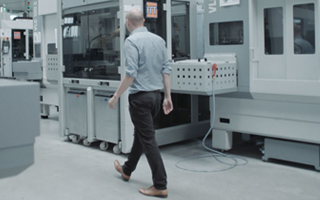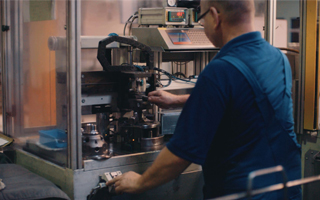This Robot Could Be The Answer To Britain's Pothole Crisis
11th March 2024
Ask any motorist to list their biggest gripes about driving on UK roads and the chances are potholes will be a chief complaint.
The scourge of drivers across the country, depressions in surfaces are downright…well, depressing.
Thankfully a solution is imminent and comes in the form of an AI robot. Naturally.
The Autonomous Road Repair System – or ARRES for short – is the creation of a tech company with close ties to Liverpool University.
Robotiz3d benefited from the school’s Enterprise Investment Fund and teamed up with Highway Engineers from Hertfordshire County Council for this unique project.
Using state of the art technology, these engineering masterminds have developed a roaming droid that can not only detect but fix potholes. Yes, really.
The first of its kind anywhere in the world, the bot also known as ARRES PREVENT fills cracks in the road with tar. It did exactly that in a recent North Lindon trial which could pave the way for a wider rollout and the end of pothole pain.
How Are Potholes Created?

Potholes occur when older roads suffering from poor drainage begin to crack.
Water gradually enters the surface and, in colder months, ice can begin to seep through said cracks.
Over time the sheer weight of traffic then causes small blocks of asphalt to be flicked outwards. Heavy periods of rain duly conspire to expand and deepen any holes that have formed in their wake.
Different kinds of holes then appear in bank balances as drivers are forced to pay out for all kinds of costly repairs. Cracked alloys, buckled wheels and misaligned tracking are common issues caused by inadvertently driving over potholes.
In January over one million examples were said to be present on UK roads. According to the AA, 630,000 road incidents linked them were reported to authorities in 2023 and half a billion pounds spent by drivers fixing pot hole related damage to vehicles.
To compound the misery, compensation is hard to come by. Insurance claims are usually paid only when potholes have been reported but not fixed within the local council’s set timeframes.
The numbers are eye-watering and the government is struggling to turn the tide.
£2.8 billion was recently ringfenced for road repairs in the South and South East alone.
Yet Northumberland is the area worst effected, with an estimated 180,000 cavities recorded in this region. This is for all intents and purposes a motoring epidemic.
Hence the optimism surrounding the ARRES project.
How Does ARRES Fix Potholes?

The robot is proven to successfully scan road surfaces for depressions. Moreover, it can correctly categorise these as one of a pothole or crack. Depending on the analysis, the machine will either repair immediately or list that patch of road as one worthy of further inspection.
When action is required, it uses a hanging arm to carefully dispense tar into cracks. This liquid fills the cavity and keeps surface water out, preventing further damage.
It goes without saying, this entire process accelerates the restoration of roads.
As things stand, the average pothole takes 15 months to repair. The engineers working for Robotiz3d believe their robots will see them fixed 70% faster. That’s logical, after all, machines need rely on neither rest nor sleep.
Co-founder Sebastiano Fichera talked up his invention at a recent press day.
“We've developed a system that prevents potholes”, he said. “It does this through scanning the road detecting the cracks and through a bit of artificial intelligence, identifying which one needs to be filled. By filling out the cracks it prevents water ingress and this prevents in turn the pothole to appear.”
Fichera was no doubt buoyed by the success of a recent test event in Potters Bar, North London.
Robotiz3d posted a video online depicting the repair of a hazardous pothole, proudly boasting their robot had passed with ‘flying colours’.
This is a venture many have a vested interest in.
Indeed Hertfordshire County Council (HCC) were all too willing to host the trial given they’ve forked out £40,000 on road repairs themselves in the last year.
The government itself also stumped up £30,000 to assist in a development that started as far back as 2020. That articular grant stemmed from the Transport Research and Innovation department.
Next Steps for the ARRES PREVENT

So what happens next?
Well, more trials are now scheduled to take place as engineers seek to refine the ARRES and ready it to identify a host of different road defects. Full production of a much larger machine seems inevitable.
Deputy Executive Member for Highways at HCC, Councilor Reena Ranger, said what’s happening in their county could influence national policy.
“The test is another step in the right direction towards solving the pothole problem this country faces”, she reiterated. “We're committed to maintaining our road network so that it remains one of the best in the country. We're excited for the time we can welcome PREVENT officially to our team.”
And the public are excited for a time when potholes become a thing of the past. This is one robot we’re all rooting for.







